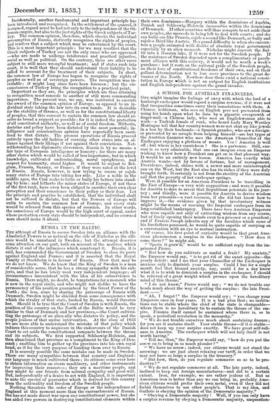RUSSIA IN THE BALTIC.
Tin attempt of Russia to coerce Sweden into an alliance with the Alitiolutist Powers is as natural on the side of Nicholas as the alli- ance would be unnatural in Sweden ; but the attempt deserves some attention on our part, both on account of the motives which dictate it and of the influences which counteract it. Russia, it is said, has commanded the Government of Sweden to close its ports against England and France ; and it is asserted that the Royal Family at Stockholm is in favour of Russia. How that may be we do not know. We do know that the King of Sweden is a man of considerable sense, that he has a strong sympathy with his sub- jects, and that he has lately used very independent language ; all circumstances inconsistent with the idea of his subservience to Russia. There might, no doubt, be temptations for a monarch who is new in the royal circle, and who might not dislike to have the permanency of his position guaranteed by the Great Power of the North ; the less, since by sharing the patronage of Russia with Denmark, Sweden might be shielded from some consequences with which the rivalry of that state, backed by Russia, would threaten her. Should it be true that the Court of Sweden is with Russia, the position of the country on the North of the Baltic would be very similar to that of Denmark and her provinces,—the Court cultiva- ting the patronage of an alien ally who dictates its policy, and the people jealous of that undue intervention. At the close of 1853 we are more able to understand the mistake of that policy which induces this country to acquiesce in the endeavours of the Danish Court to set aside the constitutional compacts between the throne and its subjects. We first supported Schleswig-Holstein, and then abandoned that province as a compliment to the King of Den- mark ; enabling him to gather up the provinces into his own royal hand, as if for the very purpose of handing them over to Russia. It is scarcely possible the same mistake can be made in Sweden. There are many sympathies between that country and England : our language is much cultivated there ; its citizens come over here to obtain information on steam machinery, and other instruments for improving their resources ; they are a maritime people, and they might be our friends from natural sympathy and good-will. But; independently of a desire to act with England, it is important to note the species of guarantee which is derived for this country from the nationality and freedom of the Swedish people. Nothing threatens the order of Europe or the independence of England at this moment more than the encroachments of Russia. She has not made direct war upon any constitutional power, but she has aided two powers in destroying constitutional elements within
their own dominions—Hungary within the dominions of Ausfria, Danish and Schleswig-Holstein immunities within the dominions of Denmark. If other countries will thus conspire to set aside their own peoples, she succeeds in being left to deal with courts ; and she can bully one like Prussia, cajole a second like Denmark, or bully and cajole a third like Austria. Her grand difficulty is when she encoun- ters a people animated with dislike of absolute royal government especially by an alien monarch. Nicholas might convert the Bal- tic into a Russian lake, if it were not for the Swedish people. If the resistance of Sweden depended upon a complimentary or parch- ment alliance with this country, it would not be worth a week's purchase : but it rests on the national pride of the Swedish people, on their love of constitutional freedoms of their own, and on their gallant determination not to lose more provinces to the great de- vourer of the North. Nowhere does there exist a national consti- tution in Europe which is not an outpost for English institutions and English independence against the grand invader.


































 Previous page
Previous page